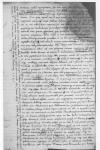Letter #2612
[Ioannes DANTISCUS] to Cornelis [DE SCHEPPER]Heilsberg (Lidzbark Warmiński), 1543-01-29
English register:
A disabled hand has forced Dantiscus to dictate his letters to his secretary for the past three months.
He sends this letter through Krzysztof Konarski, the King of Poland's [Sigismund I's] envoy to [Mary], the Queen of Hungary and Governess of Burgundy [i.e. the Habsburg Netherlands]. He entrusts Konarski to De Schepper's care as a greatly talented young man from Prussia and asks that he recommend him to the Queen.
De Schepper's latest letter, which reached Dantiscus through Wolfgang Haller, was dated 30 January 1542. Worried by the long breaks in their correspondence, Dantiscus encloses a copy of his reply, sent on 18 April 1542, and of the letter he sent De Schepper on 6 August 1541 through Kersten Gustlef.
News from Poland will be imparted to De Schepper personally by Konarski. Dantiscus encourages De Schepper to apply to represent the Queen [Mary] at the wedding of the young King [Sigismund II Augustus]. Konarski will try to support his efforts. If they are successful, Dantiscus will also attend the ceremony despite his health problems.
Dantiscus advises De Schepper regarding the conflict between the Netherlands and Denmark. He suggests not striking up a friendship with Hamburg.
He sends De Schepper and his wife and children best wishes on his own behalf and on behalf of his siblings and members of his household. He informs him that Bernhard [von Höfen] is the starost of Heilsberg and still unmarried while Georg [von Höfen] was married in Gdańsk to the mayor's widow.
Manuscript sources:
Prints:
| ||||||||||
Text & apparatus & commentary Plain text Text & commentary Text & apparatus Excerpts concerning Dantiscus' travels
Magnifice Domine et mi frater et amice Corneli carissime.
Salutem tibi atque omnia precor faustissima ex animo .
[Ne te] a lectione de[trah]at, quod ma[num m]eam non vider[is], [valde] enim affectus sum [hac mea] nova, invitus, dignitate , magistratu dictaturae oneratus, quod illa sui mihi usum iam a tribus ferme mensibus negaverit.
Cum tamen is nobilis Prutenus dominus
Ceterum, ut tecum fraternum in modum congrediar, novissimas tuas cf.
Tu, mi carissime Corneli, nequaquam in tuum admittas animum me tibi esse alium vel umquam futurum, quam qui fuerim ab eo tempore, quo tu me tibi fratrem et amicum esse cognovisti atque expertus es integerrimum, utinamque, si in eo, quod non spero, haesitas, mihi daretu[r] occasio, ut re ipsa, quod loquor, significationem declarationemque facere liceret nihil a te alienum in Dantisco tuo, ne hilum quidem sentires nedum agnosceres. Sic enim tuus ille candidissimu[s animus] meo conglutinatus et infixus est, ut neque vita, neque m[ors] a coepta in te mea benevolentia me umquam distrahere poterit. Sed de iis [hac]tenus.
Ea, quae apud nos et quae mecum aguntur, cum hunc ingenuum
De negotiis non est, quod scribam. Mihi numquam placuit, quod quorundam, qui privata curant commoda,
Teque, mi carissime Corneli, frater et fili, prout a me haberi vis, unice carissime, cum
Ex arce mea
[1 ] The wedding of Sigismund II Augustus to

